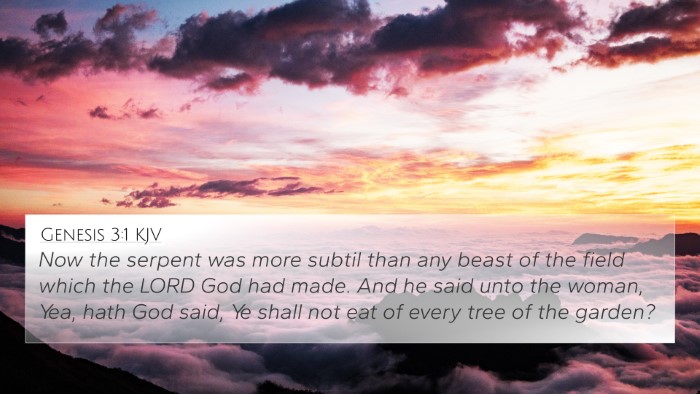Understanding Matthew 26:4
Matthew 26:4 reads: "And consulted that they might take Jesus by subtlety, and kill him." This verse occurs in the context of the plot against Jesus leading to His crucifixion. In this summary, we will explore its meaning and implications according to renowned public domain commentaries such as those by Matthew Henry, Albert Barnes, and Adam Clarke.
Summary of Verse Meaning
This verse highlights the secretive and deceptive nature of the religious leaders’ intentions against Jesus. Let’s analyze this deeper.
Insights from Commentary
- Matthew Henry: Henry emphasizes the malice and craftiness involved in the plot. The leaders aimed to capture Jesus without causing a public uproar, revealing their fear of the people's reaction and their desire to eliminate the challenge to their authority.
- Albert Barnes: Barnes notes that the phrase "by subtlety" underscores the cunning strategy of the chief priests and scribes. He implies that this method reflects human weakness and sinfulness in scheming against righteousness.
- Adam Clarke: Clarke provides a broader context by linking this instance to prophecies of betrayal found in the Old Testament, suggesting a divine foreknowledge of these events. He underscores the moral corruption of the leaders amid their external piety.
Thematic Connections
This verse lays the groundwork for understanding the complex relationships within the Gospel narratives and ultimately the purpose of Christ’s mission. Below are key themes and connections to consider:
Cross-References
- John 11:53: "Then from that day forth they took counsel together for to put him to death." This verse illustrates the continuance of the plot against Jesus and indicates the severity of their intentions.
- Luke 22:2: "And the chief priests and scribes sought how they might kill him; for they feared the people." This is a parallel that confirms the motivations behind their secretive planning.
- Mark 14:1: "After two days was the feast of the passover, and of unleavened bread: and the chief priests and scribes sought how they might take him by craft, and put him to death." This adds a layer that contextually aligns craftiness with their methods.
- Psalm 2:1-3: "Why do the heathen rage, and the people imagine a vain thing? The kings of the earth set themselves, and the rulers take counsel together, against the Lord, and against his anointed…" This prophetic psalm reflects the conspiratorial nature of rulers against God's plans.
- Isaiah 53:3: "He is despised and rejected of men; a man of sorrows, and acquainted with grief…" This situates Jesus' coming rejection and conspiracy within the prophetic texts that reflected the suffering Messiah.
- Matthew 27:1-2: "When the morning was come, all the chief priests and elders of the people took counsel against Jesus to put him to death…" This verse serves as a culmination of their subversive plans outlined in Matthew 26:4.
- Acts 4:25-28: "Who by the mouth of thy servant David hast said, Why did the heathen rage, and the people imagine vain things? The kings of the earth stood up, and the rulers were gathered together against the Lord, and against his Christ." This New Testament reference reiterates the plot against Jesus as a fulfillment of Old Testament prophecy.
Theological Implications
The actions described in this verse connect to broader themes of sin, betrayal, and divine sovereignty. Several observations can be made:
- The sinfulness of mankind is evident in the deception used to achieve their ends, reflecting a timeless human condition.
- This narrative showcases the tension between divine foreknowledge and human agency, a significant theological discussion point.
- The secretive plotting points to the prophetic fulfillment, reminding readers of God’s sovereign plan even amidst human treachery.
Practical Applications
For the modern believer, the passage invites reflections on the following:
- Integrity: It challenges us to examine our motives in our actions and to avoid manipulative behavior.
- Understanding God’s Sovereignty: It reaffirms the truth that God’s plans transcend human machinations.
- Awareness of Conspiracy: Being cautious of influences that encourage reasoning contrary to integrity and truth.
Conclusion
Matthew 26:4 serves as a crucial pivot in the narrative of Christ's passion. By combining insights from key commentaries, we see that it offers profound reflections on human nature, divine prophecy, and the intricate web of relationships within the scriptural context. The importance of linking Bible scriptures is affirmed, as it enriches understanding and enhances our spiritual journey.
Further Study
For those delving into a deeper comparative Bible verse analysis, utilizing tools for Bible cross-referencing will greatly enhance your research and understanding of scriptural themes. Consider exploring additional resources or study methods that facilitate inter-Biblical dialogue, allowing you to identify connections between Old and New Testament references. This will benefit not just personal study but also enrich sermon preparation and theological discussions.









